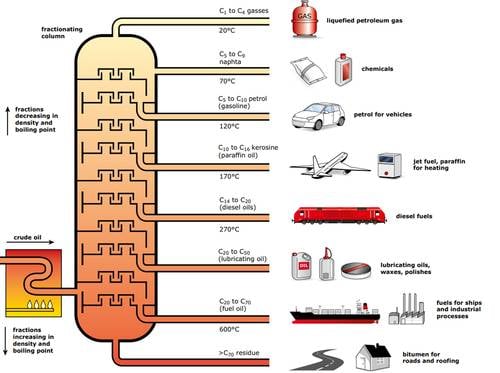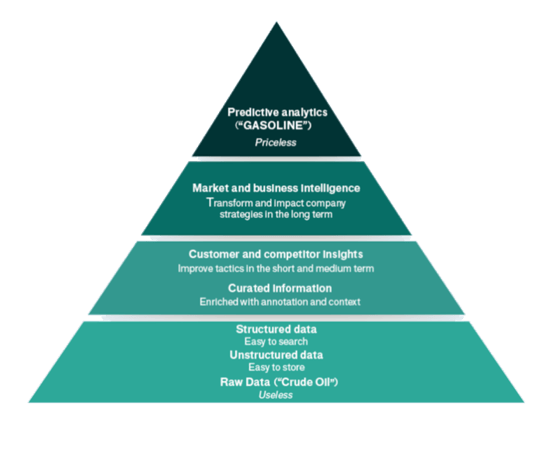
What is data? How can it be refined? And what does it have in common with Wagyu beef? One man who can answer those questions is Ali Riaz, CEO of OrbitMI, and I spent an hour with him as he shared his thoughts on digital transformation and data.
At its heart, data consists simply of zeros and ones, but if it were delivered in that form it would be useless. Instead, it must be processed, assessed and combined with other data sets until it becomes what Ali calls ‘actionable insight’ that is essential to make the most-informed decisions. It is a transition that he compares with refining crude oil into its lighter and more valuable fractions.
The graphics below sets out the alignments he sees between the two processes: raw data is like crude oil; fresh out of the ground and of little use.

But just as that oil can be refined to provide lubricants, a range of fuels and finally gas, so can data be structured, curated and transformed by machine learning and artificial intelligence to deliver the insights and intelligence needed to make it actionable and lead to its highest purpose: to support business-critical predictions.
 To make his point about the benefits of sophisticated data tools, Ali recalled the printed Yellow Pages business directories that were issued for many years across the globe but have been replaced by online and searchable databases.
To make his point about the benefits of sophisticated data tools, Ali recalled the printed Yellow Pages business directories that were issued for many years across the globe but have been replaced by online and searchable databases.
That is not to say that printed books don’t have value—at one point they were the only way to find a competent plumber nearby. Rather his point is that, more important than the form in which data is stored is whether it can be transformed into “something that can be used across an organization to drive business decisions and get a good return,” Ali said. With digitalization, these types of directories could be searched, shared, augmented with other media like video and easily corrected if an error made it through.
Which takes us to the subject of data accuracy.
Accuracy is vital, but data must be more than that: it must be delivered in a timely manner. A database of historical winning lottery numbers will contain accurate data, Ali pointed out, but will have no value because it cannot be used to make current decisions, never mind future predictions.
Compare that, he said, with how investment banker Goldman Sachs got ahead of its competitors: by adopting high-speed trading algorithms using accurate share price data that was updated in fractions of a second and delivered when it was most valuable to the organisation.
Whatever type of data is provided from whatever source, its quality is paramount. This is where Ali’s Wagyu beef comes in: once that Japanese delicacy has been tasted, the “frozen and unrecognisable meat from the local grocery store” will never fully satisfy. In the same way, when a manager has known the benefit of high quality data that delivers ‘actionable insight’, there is no going back to inferior sources.
To Ali, this is obvious. Once users become accustomed to that level of informative data, plain old ‘insight’ will never satisfy. “Why wouldn’t you want the best when you know of what’s available to you?” he mused.
Yet the maritime sector lags behind other industries, Ali has found. For years, he said, while other industries have become more data-driven, the maritime sector is still at the level where banks were in the 1990s, he said.
This does not encourage companies developing data-based services to give maritime applications much priority. But OrbitMI’s service is changing that, Ali said. It is built on a maritime foundation and draws on its original development as an in-house tool for Stena Bulk where its founders realised that what they needed was not data; “what they wanted were answers,” Ali said.
It delivers those answers because is not based around silos of single-purpose data. Instead it handles a blend of data types – like the oil fractions found in every barrel of crude oil – to distil its conclusions. Combining real-time weather data with current ship positions could reveal how many vessels are currently operating under storm conditions, for example.
That might explain why a particular ship is burning more fuel than normal. If not that, another data set might reveal it is behind schedule and making up time. Perhaps a third data source shows it is not operating at its optimum trim allowing adjustments to be immediately made.
That example is just one fraction of the actionable insights that Ali believes can be drawn from a properly-built, properly-managed and properly-refined database. They are vital for oiling the wheels of every well-run organisation.
These Stories on Digital Transformation